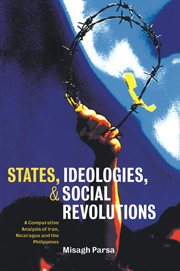 States, Ideologies, and Social Revolutions
States, Ideologies, and Social Revolutions Book contents
- Frontmatter
- Contents
- List of tables
- Preface
- Part I: Theory and structural background
- Part II: Mobilization and collective action
- Prelude
- 4 Students: relentless revolutionaries
- 5 Clergy: actors with relative impunity
- 6 Workers: rebels with dual targets
- 7 Capitalists: reluctant rebels
- Part III: Outcomes and conclusions
- Bibliography
- Index
4 - Students: relentless revolutionaries
Published online by Cambridge University Press: 22 September 2009
- Frontmatter
- Contents
- List of tables
- Preface
- Part I: Theory and structural background
- Part II: Mobilization and collective action
- Prelude
- 4 Students: relentless revolutionaries
- 5 Clergy: actors with relative impunity
- 6 Workers: rebels with dual targets
- 7 Capitalists: reluctant rebels
- Part III: Outcomes and conclusions
- Bibliography
- Index
Summary
Social theorists have often maintained that social revolutions generally do not begin with revolutionary intentions and that the causes and the processes of revolutions cannot be understood in ideological terms (Skocpol 1979:17). Analysts of large-scale social conflicts have argued that the collective actions of ordinary people and working classes are, by and large, conservative in nature and involve attempts to defend and preserve established rights (Calhoun 1983; Goldstone 1991b: 419-420; Hobsbawm 1973:12; Migdal 1974:248; Moore 1978:351-352; Scott 1979:129). These analyses, which originated largely from the European historical experience, cannot be applied to students in contemporary revolutions in developing countries. Students in developing countries have been at the forefront of revolutionary struggles and have revealed a very intense interest in fundamentally transforming the social structures. They have enjoyed immense prestige and have often played a very significant role in the revolutionary process. But even scholars of revolutions in contemporary developing countries have failed to examine the significant role of students in revolutions.
As relentless revolutionaries, students have leapt to the forefront of the insurgencies in both timing and frequency of collective action in contemporary social revolutions in developing countries. Highly concentrated in colleges and universities, students possess extensive communication networks, which facilitate their collective action. Students in higher education often benefit from universities' relative autonomy – where it exists – and academic freedom, which provide them, at least theoretically, with immunity and insulation from state repression.
- Type
- Chapter
- Information
- States, Ideologies, and Social RevolutionsA Comparative Analysis of Iran, Nicaragua, and the Philippines, pp. 94 - 129Publisher: Cambridge University PressPrint publication year: 2000


